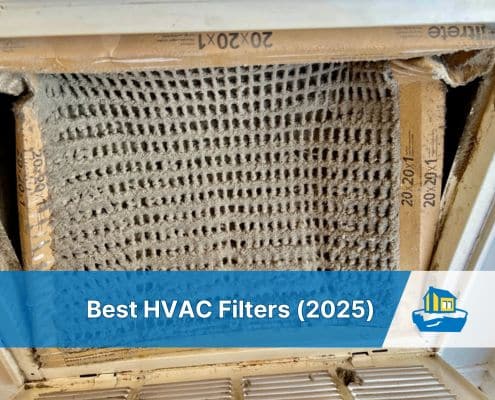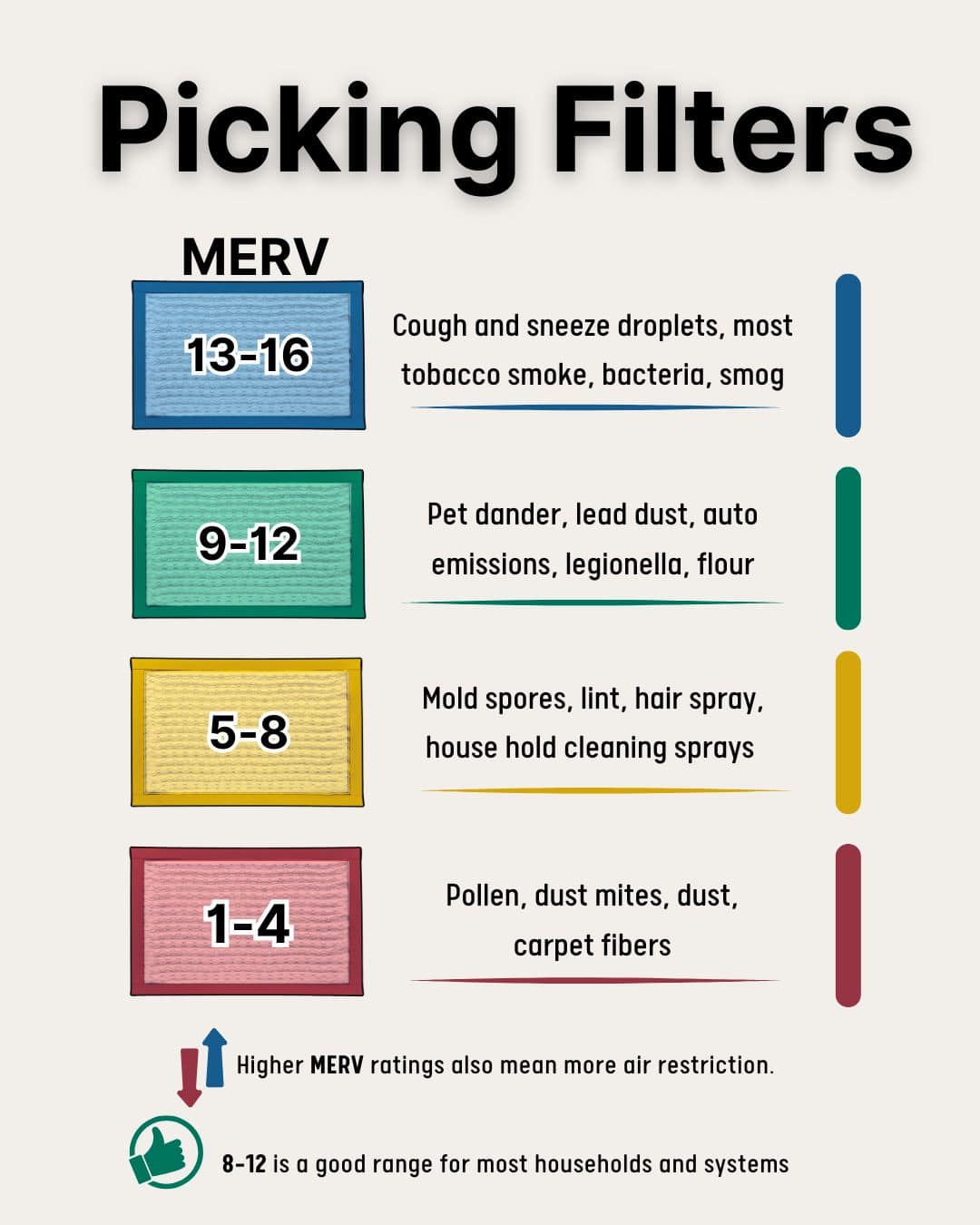4.9 1890+ Google Reviews

Most homeowners at least know that their HVAC system(heating, ventilation, air conditioning) has a filter and needs to be changed. But, based on our inspections here in Chesterfield, I think most homeowners also forget to change their filters. I decided to take a few minutes to explain how to pick the best HVAC filters.
There are some words you will need to understand when choosing your filter.
HEPA- HEPA stands for high-efficiency particulate absorbing (filter). HEPA filters are really the
MERV Rating - Minimum Efficiency Reporting Value. High merv rating filters, filter more particles than low merv rating. The scale goes from 1-20. For residential use, you should use a filter with a rating between 9 and 13. Any lower rating is going to allow larger particles through, and any filters with higher merv ratings are more appropriate for medical facilities.
MPR- A filter’s MPR rating (Microparticle Performance Rating) denotes its ability to capture tiny dust particles between 0.3 and 1 micron in size. The higher the MPR, the more microparticles it will capture.

Excellent for pet owners and allergy sufferers
Enough for the average homeowner
As a society, we are spending more and more time indoors. We are also building our houses tighter and tighter to reduce our home's energy consumption and our carbon footprint. Tighter homes, though, mean less natural air flow from outside and a decrease in indoor air quality. Residential homes have essentially swapped clean air for energy efficiency. The first step in tackling this issue starts with choosing the right filter for YOUR HVAC unit.
The air in our home contains many airborne particles, such as mold spores, dust mites, dust mite debris, other airborne allergens, and airborne contaminants. Pet owners also deal with pet dander and pet hair. The best HVAC air filters on the market today can filter these harmful particles, resulting in cleaner air.
It's not just about your air quality, though. Choosing the wrong filter or leaving a dirty filter in your air conditioner for too long can damage the system. A simple explanation of the air handler inside your house is that air is pulled in through the return (the bigger vents), air passes over the furnace heat exchanger or air conditioner coil, and then is pushed out to your supply vents. A good filter filters out the fine particles so they don't clog and damage your HVAC components. A dirty filter doesn't allow enough air to pass over these components. Not only will this increase energy costs, it can cause the components to get too hot or too cold and damage them.
Before you start shopping, it’s essential to get familiar with the different types of filters and what their ratings mean.
Fiberglass Filters:
These are often the most affordable option. However, while they capture larger particles, they tend to miss smaller pollutants. They’re best suited for basic filtration needs and for homes without significant allergy concerns.
Pleated Filters:
In many cases, these offer the best balance between cost and performance. The increased surface area in pleated filters allows for better particle capture without overly restricting airflow.
Electrostatic Filters:
These use static electricity to trap particles, making them effective against dust and allergens. Although they might come with a slightly higher price tag, they’re a popular choice for those looking to enhance indoor air quality.
Washable or Reusable Filters:
As the name suggests, these can be cleaned and reused, making them an eco-friendly option. However, their performance can vary, and maintenance is key.
When shopping for a filter, you’ll notice a rating system called MERV (Minimum Efficiency Reporting Value). Here’s a quick rundown:
Tip: Always check your HVAC system’s manual to see what MERV rating is recommended. This ensures you strike the right balance between filtration efficiency and system performance.
Now that you know the basics, it’s time to think about your specific needs.
Allergies and Respiratory Issues:
If someone in your home suffers from allergies or asthma, you might want to opt for a higher MERV rating (typically between 9 and 12). Not only do these filters trap more allergens, but they also help maintain cleaner indoor air.
Pets:
Homes with pets tend to accumulate more dander and hair in the air. A pleated filter with a higher MERV rating can capture these smaller particles effectively.
Dusty or Polluted Areas:
If you live in an area with high dust levels or pollution, investing in a better filter can help keep your indoor air clean and your HVAC system running smoothly.
Next up, you need to ensure the filter fits perfectly in your system. Filters come in various sizes, so:
Measure Your Current Filter:
Check the dimensions printed on your existing filter. It’s always a good idea to double-check these measurements before purchasing a new one.
System Compatibility:
Not every filter is right for every HVAC system. Refer to your system’s manual for recommended filter types and sizes. Using an incorrect filter can lead to reduced efficiency and even system damage.
It’s tempting to go for the cheapest option available, but keep in mind that a high-quality filter can pay off in the long run:
Initial Cost vs. Replacement Frequency:
While disposable filters like fiberglass might seem budget-friendly, you might end up changing them more frequently. In contrast, a slightly more expensive pleated or electrostatic filter might last longer and do a better job at cleaning your air.
Energy Savings:
A filter that maintains proper airflow helps your HVAC system run efficiently, potentially lowering your energy bills over time.
Once you’ve chosen the perfect HVAC filter, proper installation and regular maintenance are key to reaping its full benefits.
Follow the Manufacturer’s Instructions:
Every HVAC filter comes with its own set of guidelines. Take a few extra minutes to read through these instructions to ensure you install it correctly.
Ensure a Proper Seal:
A filter that isn’t securely in place can let dust and allergens bypass the filter, reducing its effectiveness. Make sure it fits snugly and is properly sealed.
Regular Replacement:
Even the best HVAC filters need to be replaced. For most households, changing your filter every 1–3 months is recommended. However, if you have pets or live in a dusty area, you might need to replace it more frequently.
Keep an Eye on Airflow:
If you notice your system struggling or your energy bills creeping up, it might be time to inspect and replace your filter.
Seasonal Checks:
Consider setting a reminder each season to check your filter. This habit not only helps maintain indoor air quality but also prolongs the life of your HVAC system.